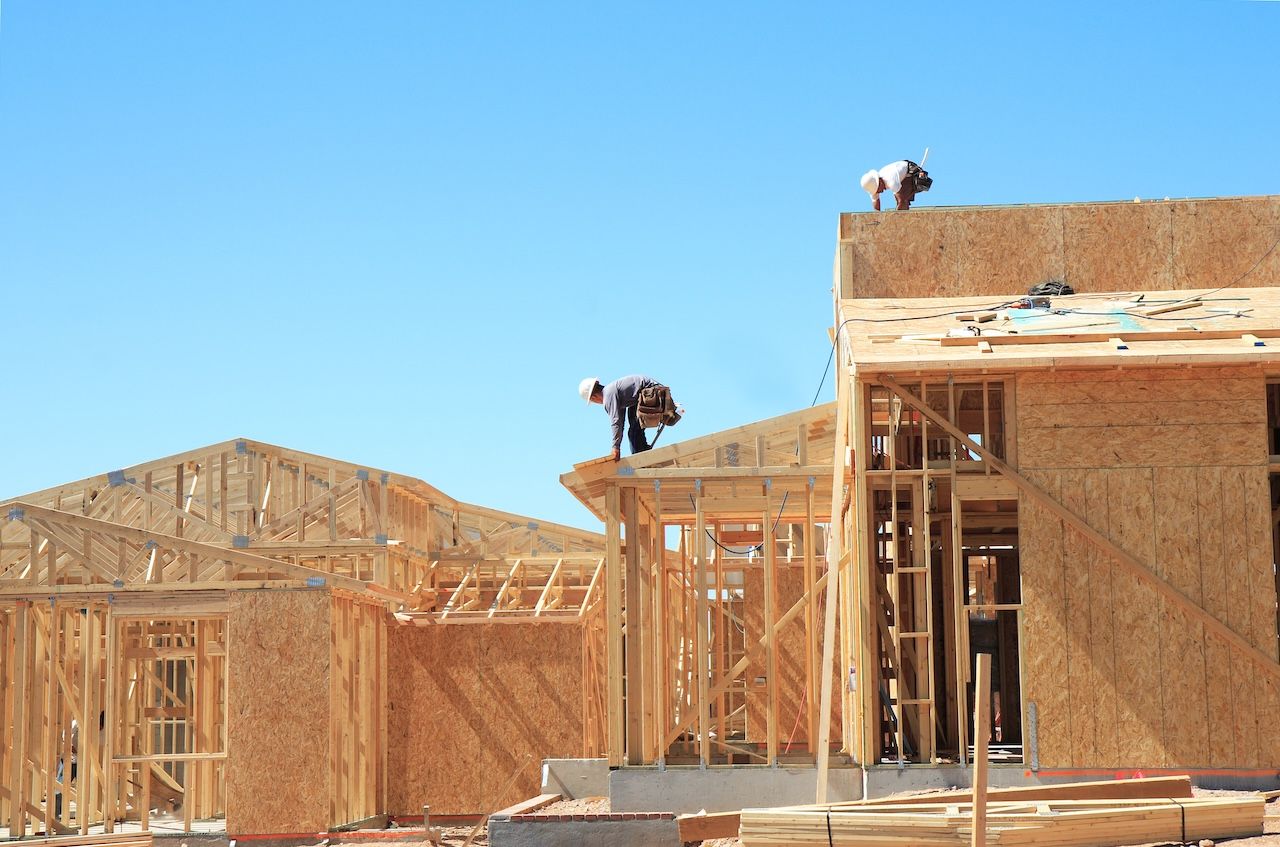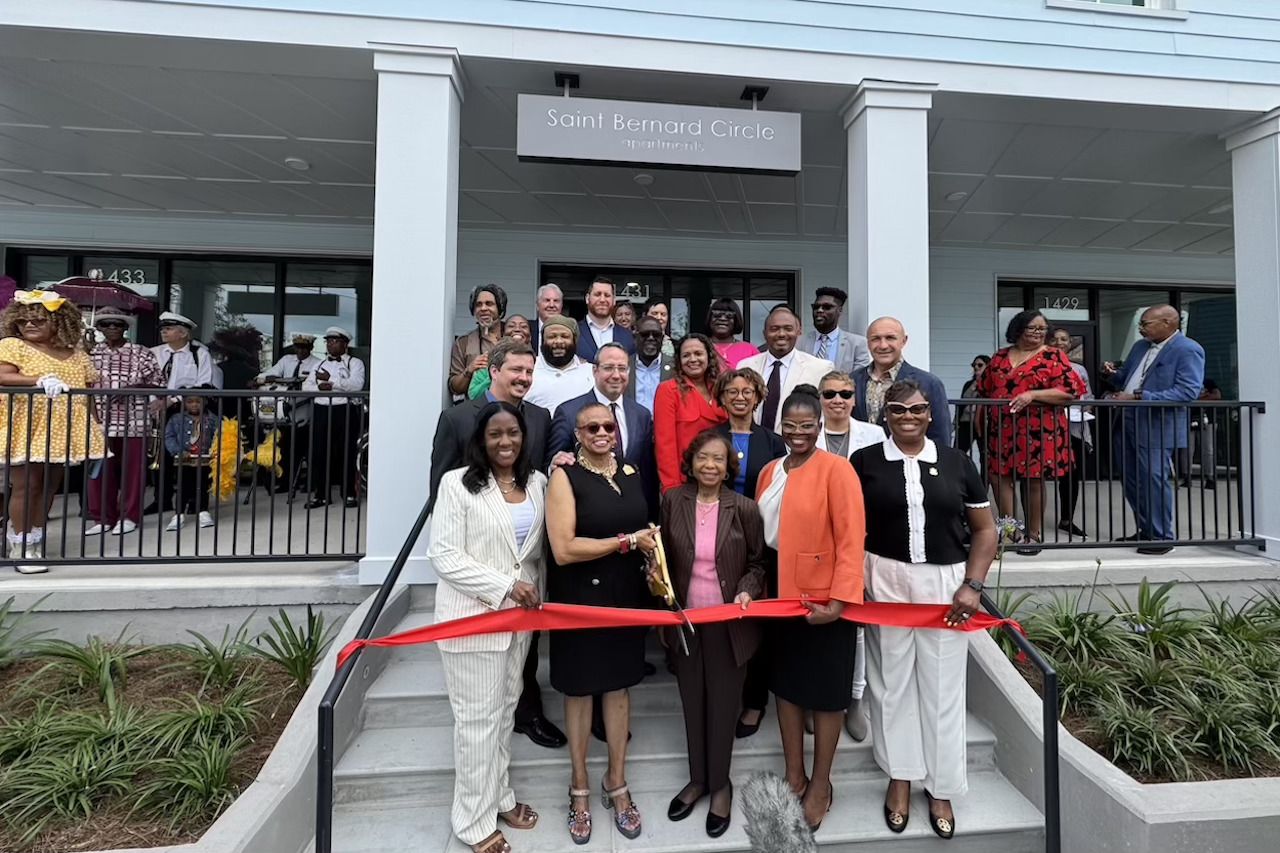Read the article on Biz New Orleans here
April 24, 2025 | Biz New Orleans
NEW ORLEANS (press release) – The New Orleans Redevelopment Authority along with Co Developers, HRI Communities, LLC (“HRIC”) and New Orleans Restoration Properties (“NORP”), are proud to announce the grand opening of the St. Bernard Circle Apartments, a new mixed-use, mixed-income, sustainable, residential community located at 1431 St. Bernard Avenue across from the historic Circle Food Store in New Orleans’ storied 7th Ward. A ribbon cutting took place today with remarks from public and private partners and community dignitaries including New Orleans Director of Housing Policy, Community and Workforce Development Tyra Johnson Brown, and NORA Executive Director Brenda M. Breaux. With construction led by Landis Construction Co., LLC, the event marks the official opening of the building that is already a cornerstone of ongoing revitalization in the area.
The St. Bernard Circle Apartments, a transformative $22 million development, features a four-story building with 56,000 total square feet of residential and ground floor retail space. Of the 51 mixed-income units, 40 apartments are reserved for families earning at or below 60% of the area median income (AMI), with 16 of those units fulfilling the one-for-one replacement unit requirement of the HUD Iberville/Tremé Choice Neighborhoods Initiative Grant.
“The opening of St. Bernard Apartments marks a monumental step forward in our continued efforts to provide safe, affordable housing for all New Orleanians,” said Mayor LaToya Cantrell. “This project not only addresses the pressing need for affordable housing but also strengthens our communities, creates new opportunities for local businesses, and preserves the rich culture and heritage of the 7th Ward. I’m proud to see this development come to life, and I look forward to seeing the positive impact it will have on our residents and our city for generations to come.”
Designed with an emphasis on sustainability and disaster resilience, the St. Bernard Circle development is built for certification under Enterprise Green Communities, Energy Star and FORTIFIED Multifamily Gold standards. Amenities include a fitness center, community room, community park and performance stage fronting North Robertson Street, secure off-street parking, bike parking, and in-unit washers, dryers, and dishwashers.
Development of the St. Bernard Circle site was first envisioned by the New Orleans Redevelopment Authority (“NORA”) as an extension of its long-term work in the area, including affordable homeownership, small business support, and façade improvements. NORA acquired a cluster of long vacant properties, including the St. Bernard Circle site, from a private owner in order to develop a community-centered anchor featuring new opportunities for affordable housing and small businesses.
“We are proud to mark completion of the St. Bernard Circle Apartments, a project that addresses critical needs to provide affordable housing and opportunities for local minority-owned small businesses, reflects the rich architectural and cultural heritage of the neighborhood, and embraces resilience and sustainability for the future,” stated Brenda M. Breaux, Executive Director of the New Orleans Redevelopment Authority. “This is only the beginning. We look forward to future phases of development that will deliver more affordable housing and commerce to the neighborhood.”
NORA conducted extensive community engagement which ultimately led to the selection of HRIC and NORP as developers to lease the property and create new, mixed-use reinvestment in the community. “We are thrilled to officially open the St. Bernard Circle Apartments and welcome our first residents,” said Josh Collen, President of HRI Communities. “This project represents not just quality mixed-income housing that furthers our dedication to the HUD Choice Neighborhoods Initiative, but is also a significant step toward revitalizing the St. Bernard Avenue corridor. We are committed to creating a community that prioritizes resilience, sustainability, and celebrates the unique culture of the 7th Ward.”
“NORP is proud to serve as development partner with HRI and NORA in advancing the St. Bernard Circle project, one of the final essential pieces of the Choice Neighborhoods Initiative (CNI) in the 7th Ward,” said Managing Member Paul Irons. “This partnership reflects our deep commitment to equitable redevelopment that embodies the voices and aspirations of the local community. St. Bernard Circle will provide high-quality housing and help revitalize a historic neighborhood with inclusive, place-based strategies that promote long-term resilience and economic opportunity. At NORP, we believe development is most impactful when it is community-driven, and we are honored to be a part of this vital collaboration that embodies this philosophy.”
“The opening of St. Bernard Circle Apartments is a proud moment for the 7th Ward and the entire city. This development brings affordable housing, supports minority-owned businesses, and reflects the resilience and culture that make New Orleans unique. Projects like this move us closer to the equitable future our communities deserve,” said Councilman Freddie King III, District C.
“In October 2023, we joined together at this site to break ground for the St. Bernard Circle Apartments; now, 18 months later, we are here to open the doors to the local 7th ward community,” said Council President JP Morrell. “What was once a vacant lot is now a developed site with 51 total units, 40 affordable housing units, 2 retail spaces for local businesses, and sustainable design features. The St. Bernard Circle Apartments are a leading example of what community-focused development looks like in the city of New Orleans. The positive impact this will have on our residents and city for generations ahead is something I truly look forward to.”
“I’m proud of this development, it’s a true example of what can happen when strong public and private partners work together for the good of the community,” said Marjorianna Willman, Executive Director of the Housing Authority of New Orleans.
The ribbon cutting marked the inclusion of two ground-floor retail spaces totaling 1,800 square feet, dedicated to local, minority-owned businesses. Gr8ful Events, an event management company founded by New Orleans native, Marsha McGee, will open an event space designed for elevated and intimate corporate and non-corporate gatherings. “As someone who was born and raised in this community, it is truly an honor for me to be part of the revitalization of the Claiborne Corridor at St. Bernard Ave. Being involved in this development is not just a professional achievement, but a personal one as well. I am committed to bring business into the community that ensures that the spirit and culture of the neighborhood is nurtured and preserved. I am truly Gr8ful for this opportunity,” said McGee.
Vince Craige, a local New Orleans screen print artist and entrepreneur will occupy the second retail space with Nola by Nature, an authentic lifestyle, clothing and products brand for Nola-Native and Nola-Inspired individuals to live in a naturally creative and positive way every day. The retail and gallery space will offer screen printing and DTF, embroidery and creative services. “This opportunity feels like winning the lottery—surreal, deeply nostalgic, and filled with purpose. As someone from Algiers who often envisioned being rooted on the Eastbank, having my name on a new building meant to preserve local culture feels like both a powerful manifestation and a spiritual rebirth. It’s more than just a financial blessing—it’s a chance to honor my roots, uplift my community, and be part of something truly transformative,” said Craige.
The development showcases local art and cultural elements, including a custom fabricated metal arch created by local artist and blacksmith, Daryl Reeves, and a wall at the park area designed to be the canvas for a community mural, which will be unveiled at a later date. This St. Bernard Avenue mural project is led by HRIC, NORP and Ujamaa Economic Development Corporation (“Ujamaa”) and will feature the work of one or more local artists honoring the historic culture and traditions of the neighborhood. Ujamaa is an organization focused on equitable redevelopment of the Claiborne Corridor and adjacent communities with a commitment to cultural preservation, economic opportunity, housing affordability, environmental sustainability, and safe and healthy neighborhoods.
“To see this project move from inception, perform community engagement initiatives during and beyond COVID, and now, be ready to open with a FORTIFIED Gold Star, is better than a dream come true,” said Ujamaa Executive Director, Nyree Ramsey. Ujamaa arranged for Corey Henry & the Tremé Brass Band, CID Artist-in-Residence, Sunni Patterson, and Big Chief Darryl Montana of the Yellow Pocahontas “Hunters” Black masking Indian Tribe to be a part of the St. Bernard Circle Apartments ribbon cutting.
The project was made possible through the collaboration with multiple public and private stakeholders and financial partners, each of which has actively participated in delivering the St. Bernard Circle Apartments through investments including a Ford Foundation grant, administered by NORA; $6,000,000 of HOME and GO Bond funds provided by the City of New Orleans; a reservation of 9% Federal Low Income Housing Tax Credits from the Louisiana Housing Corporation; rental assistance provided by the Housing Authority of New Orleans. Additionally, the Finance Authority of New Orleans served as the issuer of a PILOT property tax abatement; Hudson Housing Capital LLC served as the federal tax credit equity syndicator; Capital One Bank, N.A. served as the tax credit investor and construction loan lender; and Hope Credit Union served as the permanent first mortgage lender.
“We are making housing dreams come true for those who never thought it was possible,” said LHC Executive Director Kevin Delahoussaye. “We are excited to repurpose this area into a tangible necessity that will serve the community and enforce our mission of providing safe, affordable, and energy-efficient housing for Louisiana residents.”
“St. Bernard Circle is an example of community partners uniting to develop a space that has the potential to transform an area. The design of the property compliments and recognizes the culture of the community, which is of critical importance to Finance New Orleans (“FNO”). FNO is pleased to support St. Bernard Circle with public resources as we believe it’s a model for the investment we need across New Orleans,” said Damon Burns, Chief Executive Officer of Finance New Orleans.
“Access to safe, quality and affordable housing can unlock pathways to greater economic and financial success among residents,” said Desiree Francis, managing vice president of Community Finance at Capital One. “As a top community development lender, Capital One is proud to have played a role in financing St. Bernard Circle Apartments, which will provide long-term, affordable units for working families, veterans, and individuals. This community demonstrates the power of public-private investment through the Low Income Housing Tax Credit program in delivering affordable housing at scale for Louisiana citizens.”
“Hope Credit Union is always delighted to celebrate affordable housing events like this one with HRI, the City of New Orleans and so many other important partners. As a community development financial institution, putting our money to work providing much needed housing for working families is part of our mission. It’s exciting to see a vision for resilient housing come together like this one,” said Phil Eide, Senior Vice President, Hope Credit Union.
For more information on leasing at St. Bernard Circle Apartments, please visit www.stbernardcircle.com.
About New Orleans Redevelopment Authority (NORA)
The New Orleans Redevelopment Authority is a catalyst for community redevelopment, working to stimulate investment, support economic development, and promote an equitable and sustainable future for the city. NORA collaborates with public and private partners to implement innovative strategies that enhance the quality of life for residents and businesses. Learn more at noraworks.org.



